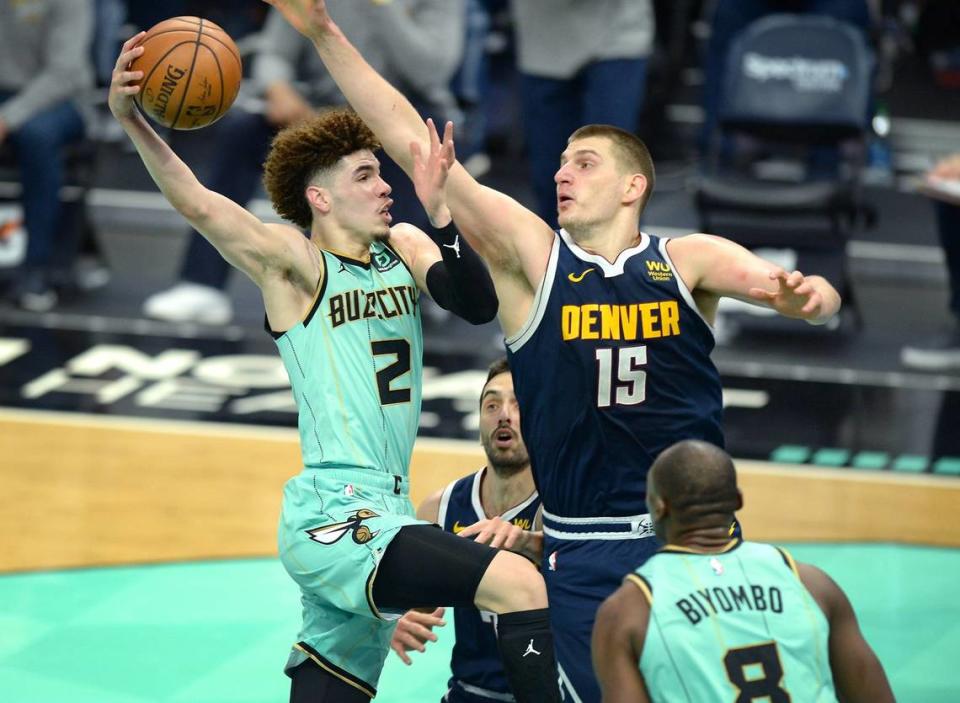LaMelo Ball wins NBA Rookie of Year. Why voters stuck with him after he broke his wrist
Editor’s note: This story was written and reported by Observer Hornets reporter Rick Bonnell before his passing.
Nothing stopped LaMelo Ball’s rookie season, not even a broken wrist.
Ball was named NBA Rookie of the Year on Wednesday, beating out finalists Anthony Edwards of the Minnesota Timberwolves and Tyrese Haliburton of the Sacramento Kings.
Point guard Ball averaged 15.7 points, 6.1 assists and 5.9 rebounds this past season and won the award despite missing 21 games with a fractured right wrist suffered in late March that threatened to end his season.
Ball, 6-foot-6, 180 pounds, returned spectacularly May 1 in a home victory over the Detroit Pistons, throwing an underhand pass that traveled 70-plus feet before hitting forward Miles Bridges for a layup.
While Ball had some pain and stiffness in his wrist the rest of the season, he finished strong enough to help the Hornets reach the play-in tournament, their first postseason appearance since the spring of 2016. The Hornets were eliminated from the play-in in a blowout road loss to the Indiana Pacers.
Bridges said that with a healthy Ball, anything short of a playoff appearance next season would be underachieving.
“With a healthy Melo, there are not too many teams that we can’t beat.” said Bridges, a constant target for Ball’s look-ahead passes.
“We have to make the playoffs next year,” Bridges added. “If we don’t make the playoffs, then it’s just a waste of a season.”
Hornets coach James Borrego said during Ball’s recovery from his wrist fracture that he had already done enough to win Rookie of the Year. The Hornets reached as high as fourth in the Eastern Conference standings, and Ball’s impact on that improvement was central to Borrego’s argument.
“He has clearly impacted winning, more so than I even expected,” Borrego said in early April. “When you can impact winning and put up those numbers, you are clearly Rookie of the Year.”
The voting panel — about 100 media members who regularly cover the NBA — clearly agreed.
Winning impact
Ball dominated this rookie class early in the season, winning the first three Eastern Conference Rookie of the Month awards, and leading all rookies in several statistical categories.
However, wing scorer Edwards — the No. 1 overall pick out of Georgia — made a significant case for Rookie of the Year the last third of the season, including multiple games scoring 40 or more points.
The difference, according to several voters interviewed by The Observer, was the impact Ball had on the Hornets’ team improvement.
“Ball was the clear choice for Rookie of the Year for me, as he contributed to winning in a way rookies rarely do,” said ESPN’s Tim Bomtemps, who voted Ball first, Haliburton second and Edwards third.
“While Anthony Edwards was much improved over the final couple months of the regular season, that wasn’t enough for him to catch up to the two point guards who have been atop my ballot all season.”
Jeff McDonald of the San Antonio Express-News voted Ball first, Edwards second and Haliburton third. He said Ball’s injury, combined with Edwards’ late surge, made this a race. But he ultimately stuck with Ball.
“Lamelo was far and away the clubhouse leader for the award when he hurt his wrist,” said McDonald, who covers the Spurs. “The fact Ball was able to return from that injury and complete the season removed any excuse not to reward him for the full body of work.
“Edwards and Halliburton each made a compelling case while Ball was out. Had Ball not been able to return for a few games at the end of the season, it might have opened the door to one of the other candidates.”
Draft decision
Point guard Ball became the third Rookie of the Year in Charlotte NBA history, joining Larry Johnson in the 1991-92 season and Emeka Okafor for the 2004-05 season. Each was a top-3 draft pick; Johnson was selected first overall and Okafor was second behind Dwight Howard.
Ball went third behind Edwards and center James Wiseman, selected by the Golden State Warriors. Hornets general manager Mitch Kupchak said prior to that draft that the Hornets were severely in need of a talent upgrade, so he wouldn’t lean toward positions in making the third pick.
Ball initially came off the bench before becoming an injury fill-in starter Feb. 1 in Miami. He never returned to the reserves, starting the remaining 31 games he played as a rookie.
While Ball still has much to improve — he needs to get stronger and heavier and refine his defense — his teammates talk constantly about his rare court vision and creative passing fueling Charlotte’s offense.
Southern Californian Ball played professionally in Lithuania and Australia before entering the draft. Veteran teammate Bismack Biyombo said nothing Ball encountered as an NBA rookie particularly rattled him.
Ball has said he’s never surprised by his success, after growing up playing for his dad, LaVar, and with older brother, fellow lottery pick Lonzo. His father constantly had him playing against older, stronger players, which Ball has said toughened him and taught him to work through problems.
“It’s a different way we grew up,” Ball said in May. “Anxiety? None of that.”



